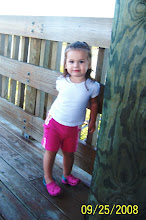Lily's grandparents came for a visit and she just blossomed with them around. I'm not sure why she is so attached to family but she had her best week yet while they were here. Great eye contact and responsiveness, it was wonderful to see. Of course now she's back to being where she was with those things, but continues to do some small but wonderful things. Since the last post here are a few things:
- She was in time out and called out for me, so I told her I couldn't talk to her while she was in time out and she said, "But WHYYYY?" Which has been her third why question that I've heard, so I'm excited about that.
- She was with Anthony at the pool and said "Baby started crying" after just that! She really has her "ing" and "ed" words down, which is great. At this point any sentencing coming out of her mouth is great to hear.
- She's been more actively playing chase and her singing has really increased, as well as her speech and articulation.
- Lily always had trouble with thinking about things in reverse. She could always fill in the blank with things like "the pig says oink" but when asked the reverse "oink says the ?" she would say "oink", but can now say pig (as well as all the other animals)
- She just recently started asking "mommy, what's this?"
Her speech therapist believes that she she has an auditory processing disorder, which I've known she has, but she believes that's her main problem and causes the rest of the problems that she has like her echolalia (repeating you word for word instead of answering your question), her lack of social skills and the hold up on her speech (she can talk but not have any kind of back and forth dialog with you, though she has her own dialog with her toys when she plays). She's like a deer in headlights when you ask her questions or say anything to her, she has no idea what you are saying at that moment so she'll repeat what you say back to you because she's trying to process what your saying (kind of like if you repeated a math question back to yourself because you are trying to figure it out), she knows she's suppose to respond but doesn't know how and also because she's been taught to "parrot" everything we say, it's how we got her talking in the first place and got her over the speech apraxia but she's also doing it out of habit. When asked simple yes or no questions she'll echo what you say instead of responding. "Do you like that?" is one I'll hear her echo a lot, but she won't echo questions she fully understands, like "what color is that?" Or "how many are there?" (she'll count them out loud for you) or "which letter is that?"
Those are concrete concepts for her that she gets. She doesn't understand questions like "what's wrong, or what's the matter?" or any number of different things. A lot of times she'll actually go through the goodbye process and not realize that that person is leaving until they are out the door or close to the door and then realizes it. It just doesn't process. Kind of like having a short conversation with someone while you are into a tv show, only to remember what was really said when you reach the commercial and think back on it. A lot of the time she is on autopilot.
Here's what I pulled off the net:
An auditory processing disorder (APD or CAPD) is a disorder in “how” auditory information is processed in the brain. It can be thought of as a “listening disorder” not a hearing disorder. The problem is in the brain – not in the ear.
Symptoms
The symptoms of APD are extremely varied, however, some of the most common are:
- Children who say “huh” or “what” frequently
- Children who don’t look or respond when their name is called
- Children who give slow or delayed responses to people talking to them
- Children who mispronounce typical word sounds
- Children who have difficulty following oral directions
- Children who misunderstand what is asked or said to them …these children usually answer off topic or don’t answer at all.
- Children who are easily distracted or become confused especially when there is background noise
- Children who avoid loud noises (cover their ears) even around common household noises
- Children who show delays in acquiring language
- Children who evidence difficulty learning phonics, reading and spelling

No comments:
Post a Comment